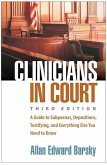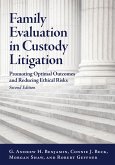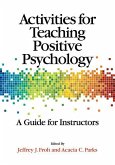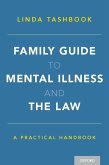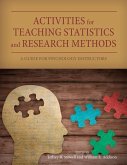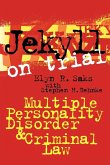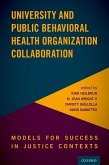Amanda D Zelechoski, Melinda Wolbransky, Christina L Riggs Romaine
Activities for Teaching Psychology and Law
A Guide for Instructors
Amanda D Zelechoski, Melinda Wolbransky, Christina L Riggs Romaine
Activities for Teaching Psychology and Law
A Guide for Instructors
- Broschiertes Buch
- Merkliste
- Auf die Merkliste
- Bewerten Bewerten
- Teilen
- Produkt teilen
- Produkterinnerung
- Produkterinnerung
Psychology instructors know that experiential activities help spark student interest and deepen their critical thinking skills and understanding of course content. This exciting compilation offers a wide variety of such activities for courses in psychology and law. With clear, detailed instructions, this book will enliven topics such as jury selection, criminal profiling, and eyewitness memory.
Andere Kunden interessierten sich auch für
![Clinicians in Court Clinicians in Court]() Allan Edward BarskyClinicians in Court56,99 €
Allan Edward BarskyClinicians in Court56,99 €![Family Evaluation in Custody Litigation Family Evaluation in Custody Litigation]() G Andrew H BenjaminFamily Evaluation in Custody Litigation99,99 €
G Andrew H BenjaminFamily Evaluation in Custody Litigation99,99 €![Activities for Teaching Positive Psychology Activities for Teaching Positive Psychology]() Jeffrey FrohActivities for Teaching Positive Psychology50,99 €
Jeffrey FrohActivities for Teaching Positive Psychology50,99 €![Family Guide to Mental Illness and the Law Family Guide to Mental Illness and the Law]() Linda TashbookFamily Guide to Mental Illness and the Law58,99 €
Linda TashbookFamily Guide to Mental Illness and the Law58,99 €![Activities for Teaching Statistics and Research Methods Activities for Teaching Statistics and Research Methods]() Activities for Teaching Statistics and Research Methods57,99 €
Activities for Teaching Statistics and Research Methods57,99 €![Jekyll on Trial Jekyll on Trial]() Elyn R SaksJekyll on Trial39,99 €
Elyn R SaksJekyll on Trial39,99 €![University and Public Behavioral Health Organization Collaboration University and Public Behavioral Health Organization Collaboration]() University and Public Behavioral Health Organization Collaboration96,99 €
University and Public Behavioral Health Organization Collaboration96,99 €-
-
-
Psychology instructors know that experiential activities help spark student interest and deepen their critical thinking skills and understanding of course content. This exciting compilation offers a wide variety of such activities for courses in psychology and law. With clear, detailed instructions, this book will enliven topics such as jury selection, criminal profiling, and eyewitness memory.
Hinweis: Dieser Artikel kann nur an eine deutsche Lieferadresse ausgeliefert werden.
Hinweis: Dieser Artikel kann nur an eine deutsche Lieferadresse ausgeliefert werden.
Produktdetails
- Produktdetails
- Verlag: American Psychological Association (APA)
- Seitenzahl: 176
- Erscheinungstermin: 27. März 2018
- Englisch
- Abmessung: 279mm x 213mm x 10mm
- Gewicht: 408g
- ISBN-13: 9781433828898
- ISBN-10: 1433828898
- Artikelnr.: 50437100
- Herstellerkennzeichnung
- Libri GmbH
- Europaallee 1
- 36244 Bad Hersfeld
- 06621 890
- Verlag: American Psychological Association (APA)
- Seitenzahl: 176
- Erscheinungstermin: 27. März 2018
- Englisch
- Abmessung: 279mm x 213mm x 10mm
- Gewicht: 408g
- ISBN-13: 9781433828898
- ISBN-10: 1433828898
- Artikelnr.: 50437100
- Herstellerkennzeichnung
- Libri GmbH
- Europaallee 1
- 36244 Bad Hersfeld
- 06621 890
Amanda D. Zelechoski, JD, PhD, ABPP, is an associate professor of psychology at Valparaiso University, where she primarily teaches courses in psychology and law, child and adolescent psychopathology, professional development in psychology, psychotherapy and counseling, and Inside-Out prison exchange courses. She is a licensed clinical and forensic psychologist and attorney, as well as a risk management consultant for The Trust. In addition to best practices in teaching and training in psychology and law, her research focuses on the intersection of psychology, law, and trauma, particularly related to forensic and mental health assessment, delinquency, and child custody and welfare. Dr. Zelechoski received her BA from the University of Notre Dame, her MS and PhD from Drexel University, and her JD from Villanova University School of Law. She completed a postdoctoral fellowship at the Trauma Center at Justice Resource Institute (Brookline, MA) and is board certified in clinical child and adolescent psychology. She received the 2016 American Psychology–Law Society Early Career Outstanding Teaching and Mentoring Award and the 2014 Valparaiso University Arts & Sciences Emerging Teacher Award. Melinda Wolbransky, JD, PhD, is a licensed attorney and clinical and forensic psychologist in Los Angeles, California, where she is the evaluation manager for Gateways Hospital and Mental Health Center's Conditional Release Program, providing psychological evaluations, expert witness testimony, and court liaison services for Los Angeles and San Diego counties. She has taught various psychology and law, general psychology, and criminal justice classes at several universities, including John Jay College of Criminal Justice, Drexel University, and the University of New Haven. She specializes in online teaching formats, having spent the past 4 years modifying course content and related experiential activities to an online setting. In addition to conducting research on effective ways to teach psychology and law, she also looks at how jury decision-making (particularly those in capital cases) is affected by evidence related to the defendant's mental illness. Dr. Wolbransky received her BS, MS, and PhD from Drexel University and her JD from Villanova University School of Law. Christina L. Riggs Romaine, PhD, is an assistant professor of psychology at Wheaton College, where she teaches courses in psychology and law, child psychopathology, and research methodology. She is a licensed clinical psychologist and associate with the National Youth Screening and Assessment Partners, providing training to juvenile justice stakeholders on implementation of evidence-based risk assessment and practices. In addition to best practices in teaching and training in law and psychology, her research focuses on the juvenile justice system and youth's understanding and appreciation of rights, as well as factors influencing their risk-taking decisions. Dr. Riggs Romaine received her BA from Gordon College and her MS and PhD from Drexel University. She completed her postdoctoral fellowship in forensic psychology at the University of Massachusetts Medical School. Before joining academia, she was a full-time clinician in the Essex County Juvenile Court Clinic, where she provided forensic mental health evaluations for the court and served as an expert witness.
Preface
Introduction
Chapter 1: Fact or Fiction: Psychology and Law in the Media
Chapter 2: Legality Versus Morality Debate
Chapter 3: A Brief Trial
Chapter 4: Who Do You Want? The Voir Dire Process
Chapter 5: Psychological Profile of a Murder Suspect
Chapter 6: Voices for Victims
Chapter 7: To Protect and Serve: Training Law Enforcement
Chapter 8: Do You See What I See? Eyewitness Identification
Chapter 9: To Waive or Not to Waive? Miranda Rights and Due Process
Chapter 10: Evaluating Juvenile Competency to Stand Trial
Chapter 11: A Journey Through Civil Commitment
Chapter 12: Do You Swear to Tell the Truth? Expert Testimony
Chapter 13: Can We Predict? Appraising and Reducing Risk
Chapter 14: Freeze! What's a Juvenile Justice Facility to Do?
Chapter 15: Problem Solved? Creating a Problem-Solving Court
Chapter 16: May It Please the Court: Amicus Curiae Brief
Chapter 17: What Would SCOTUS Do? Appendix A: Written Assignment Grading
Rubric
Appendix B: Participation Grading Rubric
Appendix C: Presentation Grading Rubric
Appendix D: Group and Self-Evaluation Form
Appendix E: Sample Activity Feedback Survey
Index
About the Authors
Introduction
Chapter 1: Fact or Fiction: Psychology and Law in the Media
Chapter 2: Legality Versus Morality Debate
Chapter 3: A Brief Trial
Chapter 4: Who Do You Want? The Voir Dire Process
Chapter 5: Psychological Profile of a Murder Suspect
Chapter 6: Voices for Victims
Chapter 7: To Protect and Serve: Training Law Enforcement
Chapter 8: Do You See What I See? Eyewitness Identification
Chapter 9: To Waive or Not to Waive? Miranda Rights and Due Process
Chapter 10: Evaluating Juvenile Competency to Stand Trial
Chapter 11: A Journey Through Civil Commitment
Chapter 12: Do You Swear to Tell the Truth? Expert Testimony
Chapter 13: Can We Predict? Appraising and Reducing Risk
Chapter 14: Freeze! What's a Juvenile Justice Facility to Do?
Chapter 15: Problem Solved? Creating a Problem-Solving Court
Chapter 16: May It Please the Court: Amicus Curiae Brief
Chapter 17: What Would SCOTUS Do? Appendix A: Written Assignment Grading
Rubric
Appendix B: Participation Grading Rubric
Appendix C: Presentation Grading Rubric
Appendix D: Group and Self-Evaluation Form
Appendix E: Sample Activity Feedback Survey
Index
About the Authors
Preface
Introduction
Chapter 1: Fact or Fiction: Psychology and Law in the Media
Chapter 2: Legality Versus Morality Debate
Chapter 3: A Brief Trial
Chapter 4: Who Do You Want? The Voir Dire Process
Chapter 5: Psychological Profile of a Murder Suspect
Chapter 6: Voices for Victims
Chapter 7: To Protect and Serve: Training Law Enforcement
Chapter 8: Do You See What I See? Eyewitness Identification
Chapter 9: To Waive or Not to Waive? Miranda Rights and Due Process
Chapter 10: Evaluating Juvenile Competency to Stand Trial
Chapter 11: A Journey Through Civil Commitment
Chapter 12: Do You Swear to Tell the Truth? Expert Testimony
Chapter 13: Can We Predict? Appraising and Reducing Risk
Chapter 14: Freeze! What's a Juvenile Justice Facility to Do?
Chapter 15: Problem Solved? Creating a Problem-Solving Court
Chapter 16: May It Please the Court: Amicus Curiae Brief
Chapter 17: What Would SCOTUS Do? Appendix A: Written Assignment Grading
Rubric
Appendix B: Participation Grading Rubric
Appendix C: Presentation Grading Rubric
Appendix D: Group and Self-Evaluation Form
Appendix E: Sample Activity Feedback Survey
Index
About the Authors
Introduction
Chapter 1: Fact or Fiction: Psychology and Law in the Media
Chapter 2: Legality Versus Morality Debate
Chapter 3: A Brief Trial
Chapter 4: Who Do You Want? The Voir Dire Process
Chapter 5: Psychological Profile of a Murder Suspect
Chapter 6: Voices for Victims
Chapter 7: To Protect and Serve: Training Law Enforcement
Chapter 8: Do You See What I See? Eyewitness Identification
Chapter 9: To Waive or Not to Waive? Miranda Rights and Due Process
Chapter 10: Evaluating Juvenile Competency to Stand Trial
Chapter 11: A Journey Through Civil Commitment
Chapter 12: Do You Swear to Tell the Truth? Expert Testimony
Chapter 13: Can We Predict? Appraising and Reducing Risk
Chapter 14: Freeze! What's a Juvenile Justice Facility to Do?
Chapter 15: Problem Solved? Creating a Problem-Solving Court
Chapter 16: May It Please the Court: Amicus Curiae Brief
Chapter 17: What Would SCOTUS Do? Appendix A: Written Assignment Grading
Rubric
Appendix B: Participation Grading Rubric
Appendix C: Presentation Grading Rubric
Appendix D: Group and Self-Evaluation Form
Appendix E: Sample Activity Feedback Survey
Index
About the Authors


